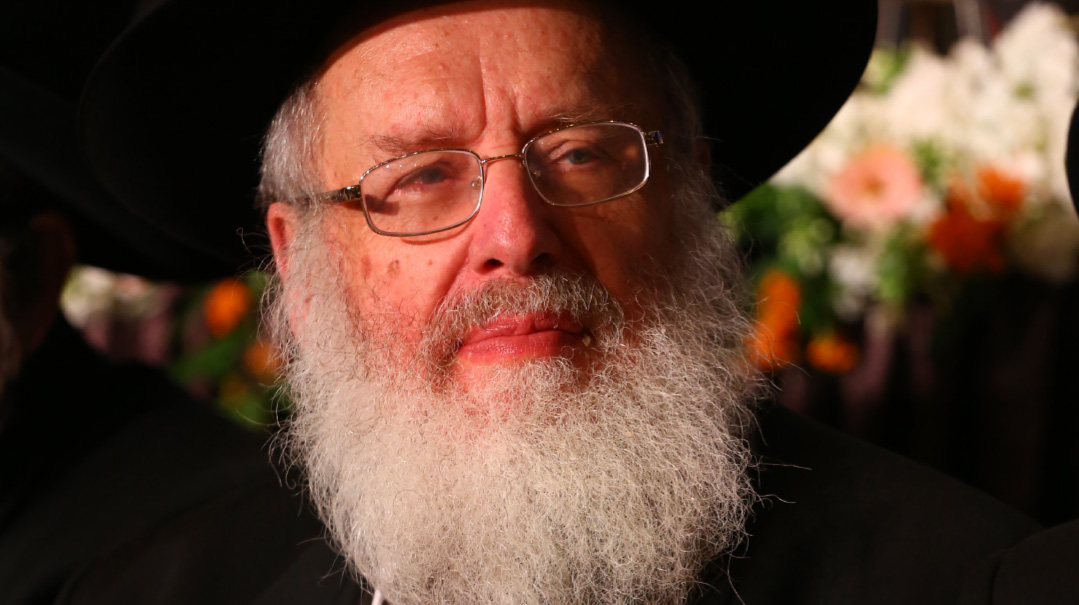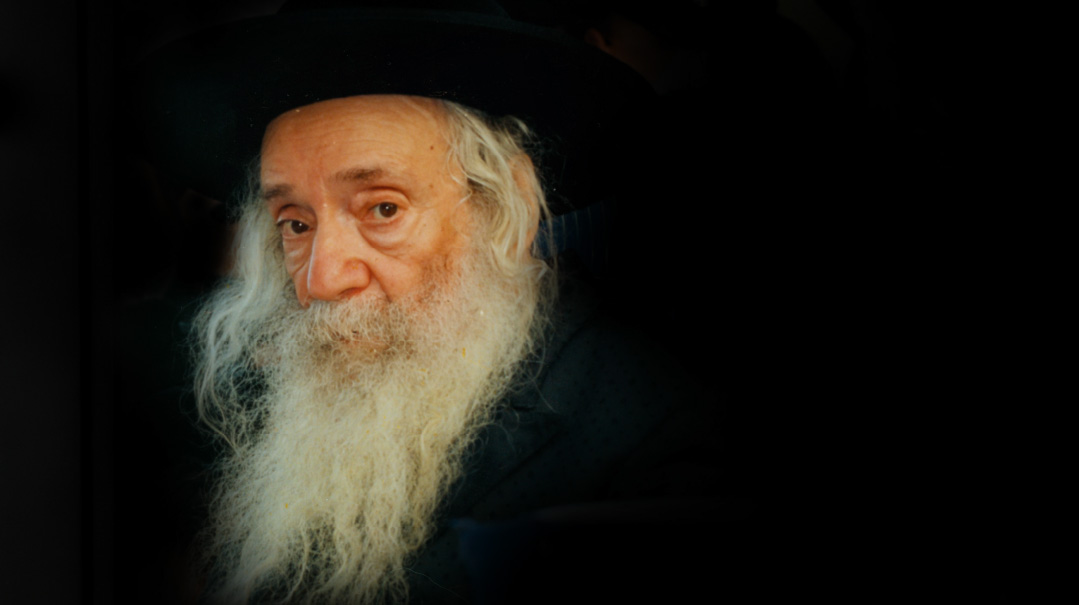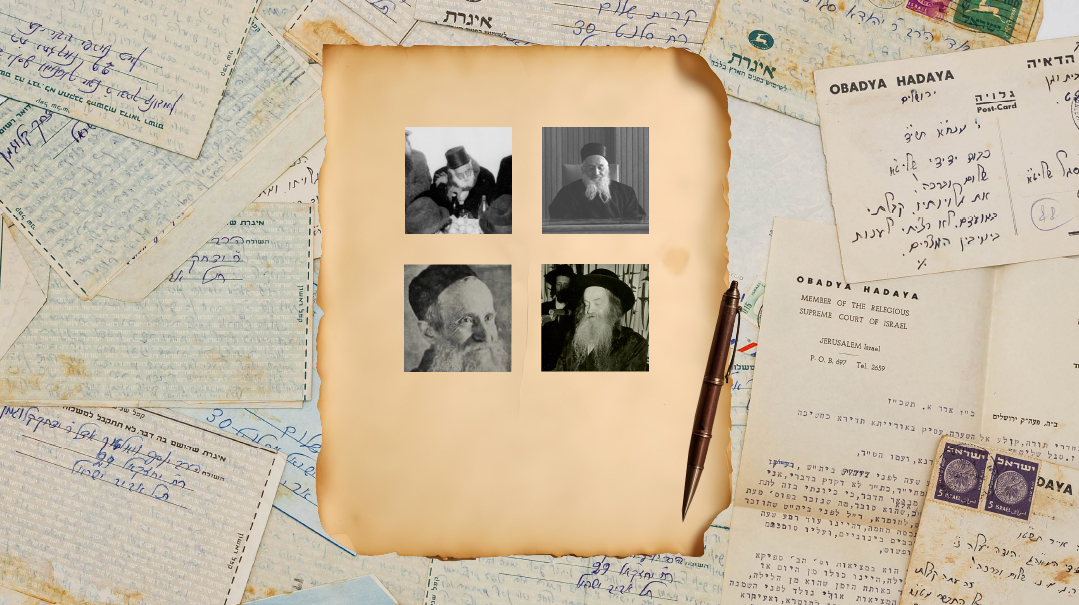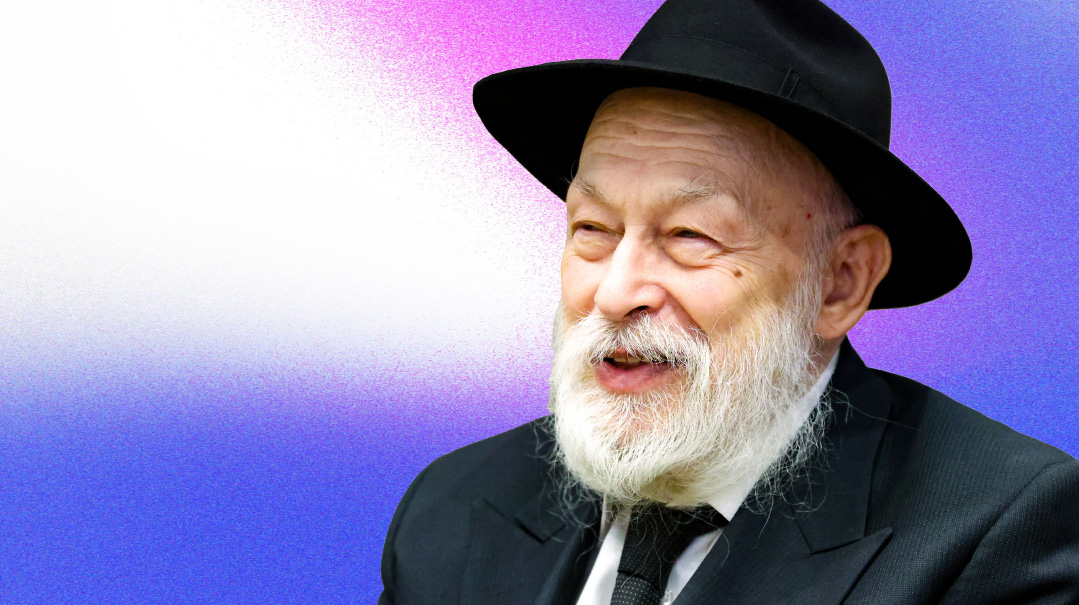At His Rebbi’s Command
| November 23, 2021Rabbi Refoel Wolf Shares His Privileged View of Rav Shach
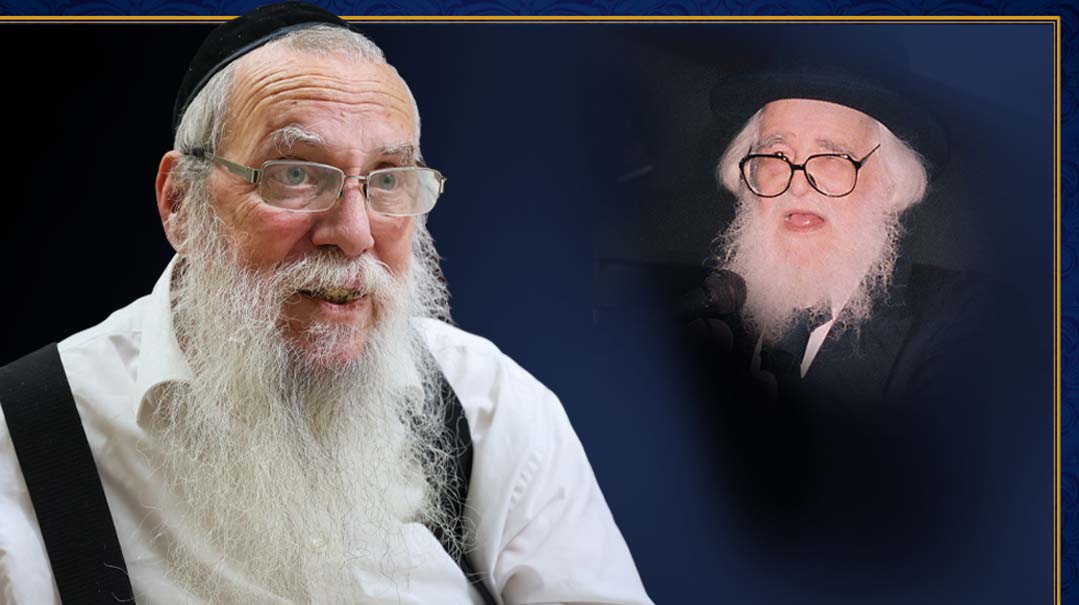
Photos Itzik Blenitsky, Personal archives
Rav Elazar Menachem Man Shach ztz”l, whose 20th yahrtzeit was recently marked, was an enigma: On the one hand, he wasn’t shy about speaking up and giving daas Torah to a sometimes-resistant public; on the other hand, this venerated rosh yeshivah of Ponevezh was extremely humble and self-effacing, not even understanding why throngs would approach him for brachos. Yet he was the father of the yeshivos in Eretz Yisrael — and not only the ones he founded and encouraged: When he heard that a child hadn’t been accepted in any school, he’d gather a delegation together and personally approach the principal. When he was elderly and had little physical strength (he passed away at 103), he still refused to go to sleep until he finished the number of dapim he committed himself to complete. “I’m an old man,” he’d say, “and I don’t know what will happen to me from day to day. I want to finish the perek in order to arrive in Shamayim with yet another perek of Gemara in my hands.”
Rav Shach was no stranger to controversies that seemed to follow him until the end of his life — as they often do to those unafraid to state politicly-incorrect ideas or sugarcoat daas Torah. Rav Shach was rosh yeshivah of the world-class Ponevezh yeshivah, although he never considered himself anything but a servant of the beis medrash, humbly making sure his days and nights were saturated with Torah learning. In fact, he requested that all pashkevilim written against him should be buried with him in his kever. He often said how all the insults a person gets in This World will help tremendously to lighten his judgment in the Next World. A talmid chacham’s wife once complained to Rav Shach that her husband was suffering from public insults. In response, Rav Shach took out a rope someone once sent him as a subtle threat. Rav Shach requested that it, too, be placed with him in his grave.
Rav Shach’s public involvement often came at another steep personal cost: It exposed him to the spotlight and forced upon him honor and trappings that were intolerable to him. “Whenever the Rosh Yeshivah attended an event, like a bris milah or siddur kiddushin, he immediately went over to the baalei simchah and said, ‘I’m here, there’s no reason to announce my name,’ making sure to prevent them from announcing him with all kinds of honorifics,” says Rabbi Refoel Wolf, right-hand man of the Rosh Yeshivah. For many years, Rabbi Wolf was privy to the gadol’s inner sanctum, having witnessed from there many personal moments as well as significant developments that affected the larger Torah community in Eretz Yisrael. He has an endless wellspring of details, on the scene when fates were rendered with clear daas Torah.
Their connection was originally based on family acquaintance from the early days of Ponevezh, when Rav Yosef Shlomo Kahaneman ztz”l, the Ponevezher Rav, would regularly stay at the home of the Wolf family when he came to London to fundraise for the yeshivah. Rabbi Wolf was just a little boy then, but the Rav’s obvious love of Torah and his yeshivah captivated young Refoel, and when the time came, it naturally followed that he would attend the yeshivah as well.
“The personal connection between Rav Shach and me began after a difficult surgery that he went through,” Rabbi Wolf recalls. “The Rosh Yeshivah, who was already elderly then, was still very independent — he hardly ever asked for anything. Even at the end of his life, he never let anyone help him put on his shoes, not even his grandchildren. He was the one who opened the door when someone knocked, insisted on preparing his own tea, and when he needed a sefer, he’d get up, slowly go to the bookcase and take it himself. Bochurim in the yeshivah already got used to not asking the Rosh Yeshivah if they could help him. He would say, ‘Einer alein — I am a person alone.’ But after the surgery he needed someone next to him.
“Rav Yechezkel Eschayek would often drive him from place to place, borrowing his father’s car. At the time, Eschayek and I shared a room in the dorm, and he suggested that I be with the Rosh Yeshivah in the hospital. Of course, I grabbed the chance, and later, when Rav Shach went to the convalescent home of the Vaad Hayeshivos in Netanya, I followed him. When Rav Shach asked what I was doing there, I told him that the doctors had ordered me to rest, and he said, ‘Then come and share my room.’
“About a week later he returned to yeshivah, but he didn’t forget me. The next time I passed him, he stopped me and asked, ‘How can I thank you?’ I replied that I wanted a close connection with the Rosh Yeshivah…
“‘Nu, aderaba, come in to me whenever you want,’ the Rosh Yeshivah replied. And I did.”
Double Identity
Rabbi Wolf spent years fielding questions for Rav Shach, storing all the slips of paper from the various questions and issues that came up in a cabinet. Four years ago, he took those tzetlach and used them as the basis for a sefer, Besa’aros Eish.
What emerged, says Rabbi Wolf, is that the Rosh Yeshivah was a truly rare mix. On the one hand, he was one of the Torah giants of his generation, learning day and night and establishing a generation of erudite marbitzei Torah as rosh yeshivah of Ponevezh. On the other hand, he was a public leader who battled for all that was holy to Klal Yisrael. And he founded the Degel HaTorah party when he was over 90 years old.
So, what was his true identity, rosh yeshivah, or public leader? “I heard from another gadol that, regarding Rav Shach, it was like the concept of ‘yotzei venichnas’ that is brought down in Shulchan Aruch regarding supervising the milking of cows. Why doesn’t it say, ‘nichnas veyotzei’ — that first he goes in, and then comes out? Why instead is the term used implying, ‘first he goes out, then comes in?’ The answer is that the mashgiach has to be inside with all his being, where his presence is needed, and even when he is outside, he is like a ‘yotzei’ — even when he’s not there, it’s as if he’s just leaving temporarily.
“That was Rav Shach. He was planted between the shtender and the Gemara. His extensive involvement in public issues was ‘yotzei venichnas’ — he left his learning for public needs only in order to return and delve once again into the pages of the Gemara as soon as he could.”
According to Rabbi Wolf, it was that “going out” that ultimately made Rav Shach the leader of bnei Torah and the litvishe communities.
“I don’t need to tell you about the gadlus of the Rosh Yeshivah. For that, you can open an Avi Ezri or see what the Brisker Rav wrote about him decades ago. Go to all the yeshivos of our time and see how many talmidim he taught, many of whom are the backbone of today’s yeshivah world. But what made him unique was his deep involvement in public issues in general and anything connected to Torah and Yiddishkeit in particular. It all came from inside, from deep and authentic care for the Jewish People.
“He would express how he often felt very alone on those front lines, without other full partners. Although for the sake of historical accuracy, he not only looked to the Steipler ztz”l as a gadol b’Yisrael but also as a partner in the burden of the leadership. They shared a consensus on most matters and also deeply respected one another.
“I remember that Rav Shach once tried to galvanize a certain public issue, and he needed widespread support. Rav Chaim Shaul Karelitz ztz”l, av beis din of Sheeris Yisrael and a nephew of the Chazon Ish, was at the Rosh Yeshivah’s home at the time, and he would later be going from there to the Steipler on another matter. I suggested that the Rosh Yeshivah send a letter with Rav Karelitz to the Steipler to ask for his support. But he recoiled at the very idea: ‘What? I should tell the Steipler what to do?’”
Perhaps one of the things that most pained the Rosh Yeshivah was what people thought he felt about the chassidic world, even though in the prewar years, he was rosh yeshivah in Karlin, which he’d speak nostalgically about.
“It’s very important to clarify this point,” says Rabbi Wolf. “There are lots of rumors and half rumors about various remarks that Rav Shach made about certain personalities. Even in the litvishe world, there are those who are proud of all kinds of personal remarks that they ostensibly ‘heard personally from him.’ But I can tell you that the majority is pure hearsay. Rav Shach was critical, but he hardly spoke of others, neither good or bad. Perhaps a word here or there, but not more than that. Rav Shach, as a follower of the Chofetz Chaim — whom he twice visited — was careful to guard his tongue. Beyond that, he was not a person of idle chatter.”
Away from Honor
And, says Rabbi Wolf, he fled from honor like the plague, even though he was so outspoken on issues that pained his soul. Rabbi Wolf remembers the first publishing of the Rosh Yeshivah’s Kovetz Michtavim Uma’amarim — he dealt with the printing and recalls how he carried the fresh volumes to the Rosh Yeshivah’s house, straight from the printer. Rav Shach, however, was aghast when he saw the title page: “Kovetz Michtavim Me’eis Maran Hagaon Rabi Elazar Menachem Man Shach shlita.” “What is this? ‘Maran! Hagaon!’” He was horrified. He took a pen and crossed out that title on each book by hand, volume after volume.
Before the first elections for Degel HaTorah, the party printed a picture of Rav Shach wearing a kittel and entering the yeshivah. Beneath the image was a caption that read, “May you be blessed from the source of brachos — our master, the gaon and tzaddik Rav Elazar Shach shlita.”
“Apparently, in the frenzy of preparing for elections, some activists got carried away,” Rabbi Wolf related. “But when Rav Shach saw this, he recoiled and instructed me to make sure that every single one was destroyed. He was repelled by inflationary titles, honorifics, and a ruckus created around rabbanim as miracle workers and brachos factories.”
Rabbi Wolf admits, in fact, that despite being one of the Rosh Yeshivah’s closest confidants, he’s never even been to his kever. Perhaps, he says, it’s a lesson he learned from the Rosh Yeshivah himself. “I’m always disturbed by the big fuss they’ve made from his tziyun. I know how far he was from that sort of thing. The Rosh Yeshivah didn’t visit kevarim. He once told me that before the war, he happened upon the cemetery in Vilna, and he didn’t even go to the tziyun of the Vilna Gaon. Today, people travel there from Eretz Yisrael, but he was right there and didn’t even go to the tziyun! When I asked him, ‘How can that be?’ he replied simply, ‘It was not our practice to go.’
“The only time he deviated from this practice was when the Brisker Rav fell ill, and at his request, Rav Shach traveled to daven at the tziyun of Rabi Shimon Bar Yochai in Meron. I once asked him if he took the opportunity to visit the kevarim of other gedolim buried in nearby Tzfas and he replied that he had not. Torah learning and teaching are what dominated his life — kevarim were not on his radar.
“Today, though, the situation has changed in the litvishe community as well,” Rabbi Wolf continues. “Some say that the litvish today have become more chassidish than the chassidim themselves… The whole fuss around gedolei Yisrael, their household members, the cars, the photos, segulos, public relations — these are things I never saw with Rav Shach.”
Rabbi Wolf remembers how one year after Yom Kippur, he asked the Rosh Yeshivah for a brachah, sourcing seforim that say how it’s proper to receive a brachah after Yom Kippur. An avreich, one of his close talmidim, then entered the room and Rav Shach said to him, “Refoel says that it is proper to receive a brachah on Motzaei Yom Kippur. Please give me a brachah…”
Of course, many people came to Rav Shach for brachos, making sure they did it in the right way.
“Whenever the Rosh Yeshivah was home, one could knock, and he would open the door himself,” Rabbi Wolf relates. “But if the person standing at the door asked for a brachah, Rav Shach would turn him down, saying, ‘I’m in the middle of learning now,’ or some other excuse. However, if the person came to seek daas Torah, he would answer him kindly and then add a warm brachah. There was always a pile of notes with the names of people needing a yeshuah. Rav Shach himself wrote those notes, and he would take them out and mention the names during Shemoneh Esreh.
“At the end of his life, when it was hard to take the small notes out of his pocket, he asked me to copy the names onto a big sheet of paper each day, in clear letters. Every so often, he gathered all these notes in a bag, put his hand onto it, murmured a tefillah, and then sent me with the bag to genizah.”
He Was Crying Throughout
Rav Shach never considered himself anything more than Hashem’s servant, driving himself to learn day and night, to give shiur in yeshivah even when his strength waned, but — perhaps against his will — he became anything but a simple beis medrash Yid when he made the famous “rabbit speech” on the stage of Tel Aviv’s Yad Eliyahu at a Degel HaTorah rally in the spring of 1990, lambasting secular kibbutzniks as “breeders of rabbits and pigs” who did not “know what Yom Kippur is.” In that same speech, he said that the Labor Party had cut themselves off from their Jewish past and wished to “seek a new Torah… If there’s no Shabbos, no Yom Kippur, then what makes them Jewish?”
These lines entered the annals of memorable speeches of the 20th century. The strong emotions that the speech evoked, and the offense that the kibbutz population felt, led to harsh responses from across the political spectrum. “How can the Judaism of kibbutznikim, with their weathered hands, be questioned? They established the State and served in the army, at great person peril!” then-president Chaim Herzog thundered.
Labor Party MK Yossi Beilin said the speech had set back relations between religious and secular Israelis by decades.
MK Chaim Oron, of the left-wing (defunct) Mapam party and a kibbutz member, responded sharply that “if our willingness to make far-reaching compromises with the chareidi parties to establish a peace government is interpreted by Rav Shach as self-negation, then he’s making a mistake, and he should wake up. With all due respect, we will not live as per the word of rabbanim,” Oron fumed.
(Thirty years forward, what would he say today about a non-Jewish athlete representing the State of Israel who wins a gold medal in the Olympics yet can’t automatically become a Jew? Yair Lapid’s refrain that “It’s intolerable that someone who brings home to Israel an Olympic gold medal cannot marry here because he is not a Jew,” or “the gold-winning gymnast is not considered Jewish enough by the rabbis who control Israel’s marriage laws,” is vaguely reminiscent.)
It wasn’t just that the left-wing MKs were personally offended. At the time, Shimon Peres was trying to put together a “peace” government, and needed Shas — where Rav Shach was the influencer — to join. They knew Rav Shach didn’t particularly espouse a hawkish position, so they thought there was hope for a coalition agreement. The speech, though, wasn’t about dovish or hawkish views. Rav Shach didn’t attack the politics but the ideology of the proposed partners, ultimately pouring cold water on the plan.
According to Rabbi Wolf, the Rosh Yeshivah didn’t say what he said by accident. He knew he was touching a raw nerve among the public.
“I believe his goal was to horrify the average secular person in the street, to make him pause for a moment and ask himself that exact question: ‘What makes me a Jew?’ He said it with great pain — he was crying throughout the speech. His heart was bleeding when he saw the direction that the country was going.”
When the Knesset considered banning pork, secular protestors handed out pork sandwiches on the street in Jerusalem. Rav Shach asserted at the time, “The distribution of davar acher on the streets of Yerushalayim and the operation of public transportation on Shabbos in Tel Aviv are more dangerous than the threats of Saddam Hussein.”
Regarding the situation in Eretz Yisrael in general and the success of the left, Rav Shach once said, “How can a person live in Eretz Yisrael in this sort of situation? It is a disgrace to live here. Does this state really deserve to be called ‘Israel’? This state is a source of shame for the Jewish people.”
A frum New York politician once asked Rav Shach whether he should combat a certain repugnant form of immorality that didn’t really affect the Orthodox Jewish community. Rav Shach replied, “You must fight it. What they permit today in America will be permitted tomorrow in Eretz Yisrael. If they allow it there, it will be legalized here.”
Still, he loved Eretz Yisrael and would encourage people to stay, even in war. During wartime, when people from overseas asked Rav Shach if they should return to chutz l’Aretz, he responded in the negative. “The same Hashem Who helps the bnei Eretz Yisrael will help the bnei chutz l’Aretz as well,” he answered. When a bochur asked if he should return to America because he was afraid, Rav Shach said, “I’m willing to give you a handshake and sign a guarantee that if you sit and learn, nothing bad will happen to you. The sinners have reason to fear, but those who keep the mitzvos have no reason to fear.”
Yet as much as Rav Shach warned of the severe spiritual dangers brought about by a secular Israel, he also opposed excessive demonstrations.
“Just as it is forbidden to antagonize non-Jews, so it is prohibited to antagonize secular Jews,” he maintained. “If an irresponsible person throws a stone at a policeman and arguments erupt, it can be dangerous.”
Rav Shach related that in Vilna, Jewish shops opened on Shabbos on the very street where Rav Chaim Ozer Grodzinsky lived. “Rav Chaim Ozer did not protest [openly] about it. Instead, he would personally enter the Jewish shops open in Vilna after Kabbalas Shabbos and say to the owners, ‘A gut Shabbos.’”
A Different World
Twenty years later, yeshivahleit often try to figure out what Rav Shach would say about the current turbulence on both the political and religious fronts. Two decades on, what would Rav Shach say about our generation?
“The Gemara describes Choni Hame’agel, who woke up from 70 years of sleep and couldn’t find his place among the new generation that had developed. What would the Chazon Ish or the Brisker Rav say about our generation? It’s clear that there has been a tremendous blossoming of Torah, in quality and quantity, but it is a totally different generation from what those gedolim knew. The atmosphere is different, the challenges are different, the language is entirely different.
“Today, every young person thinks he knows exactly what Rav Shach would say on any subject. It’s as if there is no need for gedolim anymore. Everyone is confident that he knows Rav Shach’s opinion about everything. One thing is clear to me, though. Rav Shach would have cried, ‘Aval asheimim anachnu — but we are guilty’ over the terrible state of the land. If all the chareidim would participate in elections for chareidi parties, we would have a much greater influence on Yiddishkeit in the entire country. He would often say about all the chillul Shabbos and the anti-religious decrees, erlicher Yidden in Yerushalayim are to blame because they don’t participate in elections.”
While there have been other gedolim who’ve filled the slot of “gadol hador” over the last 20 years, none of them were appointed successors — such an idea would have been anathema to the Rosh Yeshivah.
“Rav Shach never discussed the future of the public leadership. Despite his tremendous gadlus and his influence that transcended sectoral boundaries, he really and truly did not see himself as someone special who needed to be succeeded,” Rabbi Wolf explains. “He would often say, ‘Me? I’m just a pashuter Yid…’”
(Originally featured in Mishpacha, Issue 887)
Oops! We could not locate your form.

